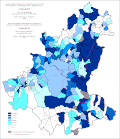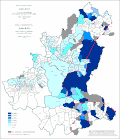Exodus of Sarajevo Serbs
The Exodus of Sarajevo Serbs (Serbo-Croatian: egzodus sarajevskih Srba; egzodus Srba iz Sarajeva) refers to the migration of ethnic Serbs from Sarajevo, the capital of Bosnia and Herzegovina, between January and March 1996 after the Dayton Agreement that concluded the Bosnian War (1991–95).


Background
The exodus of Sarajevo Serbs was one of many exoduses of Serbs during Bosnian War.[1] Right before this exodus there was another exodus of 17,000 Serbs from Odžak.[2] Both of them preceded by massive exodus of more than 250,000 Serbs from Croatia during Operation Storm which set precedents for the exodus of Sarajevo Serbs.[3] It was reported on 1 January 1996 that 'rumours and blind panic trigger mass flight from [the] city's contested suburbs'.[4]
Exodus
The Dayton Agreement finalized the demarcation between the Federation of Bosnia and Herzegovina (FBiH) and Republika Srpska (RS), the two post-war entities of the country. Ilijaš, Vogošća, Hadžići, Ilidža, Rajlovac and Grbavica were incorporated into FBiH, while other peripheral parts of the former Sarajevo municipality became part of RS (see Istočno Sarajevo). The Serb community massively left the FBiH part of Sarajevo for RS. Their number was first reported in 1996 as 62,000,[5] but it is estimated that the total number was 150,000.[3]
Australian professor Dino Murtić emphasized that exodus of Sarajevo Serbs was massive and planned and that Bosnian president Izetbegović initially demonstrated indifference about it stating that the people of Sarajevo "finally deserved to be free of their murderers".[6] After some time, Izetbegović called Serbs to stay in Sarajevo.[7]
Some Serbs exhumated the graves of their ancestors from Sarajevo graveyards to graveyards near their new accommodation.[8]
Responsibility
Some authors believed that all involved parties in Bosnia were responsible for the mass exodus of Sarajevo Serbs, including the officials of Republika Srpska.[9] For some authors it was difficult to determine if this exodus was voluntarily or forced.[10] Some authors explain that ethnic cleansing of Serbs from Croatia during Operation Storm (silently supported by major powers like United States and Germany) set precedent for the exodus of 150,000 terrified suburban Sarajevo Serbs who did not feel that a Muslim-led Bosnian government or the outside world will guarantee their safety.[3]
Media coverage
The Western observers claimed that Serbs used mass exhumations during their exodus from Sarajevo to gain moral victory.[11] Peter Brock argued that even after the 1996 exodus, the Western media still refused to acknowledge the flight of tens of thousands of Sarajevo Serbs that occurred at the beginning of the Bosnian War in early 1992.[12] Even before the exodus of Sarajevo Serbs began, another exodus of 17,000 Serbs from Odžak went unnoticed in the public.[2]
Eventually, the exodus of Sarajevo Serbs forced foreign journalists including Tom Gjelten to reconsider their initial judgement about Sarajevo being harmonious.[13]
References
- FBIS 1996, p. 27: "The exodus of Sarajevo's Serbs is just one of many Serb exoduses during this war, but it is fatal for them. The Sarajevo Serbs are the most urban, educated, and largest ..."
- FBIS 1996, p. 27: "Before the exodus of the Sarajevo Serbs, the exodus of almost 17,000 Serbs from Odzak and Vukosavlje passed unnoticed in the public."
- Chakravartty 1999, p. 120: "The ethnic cleansing of the Krajina Serbs, quietly applauded by the governments of the United States and Germany, set precedents for the exodus of frightened Serbs from Sarajevo — once the beacon of Slavic and Islamic coexistence — after the Dayton accord signed December 14, 1995, in Paris. Neither the Muslim-led Bosnian Government nor the outside world, was able to offer the suburban Sarajevo Serbs — numbering approximately 150,000— convincing guarantees of safety."
- Independent 1996.
- McEvoy & O'Leary 2013, p. 345:"On the other hand, Dayton's ethnic circumscription of space after the war had detrimental effects on Sarajevo, catalyzing a mass exodus in early 1996 of some sixty-two thousand Sarajevo Serbs from inside what would be the Dayton borders of Sarajevo city and its suburbs and creating today's more monoethnic postwar city (Internal Displacement Monitoring Centre 1996)."
- Murtic 2015, p. 164: "Some Serbian families even dug out and transported the remains of their ancestors from the graveyards. For them, life under the political domination of Bosniaks and/or Croats was out of question. The Izetbegovic government in Sarajevo showed indifference to this massive, planned exodus of Sarajevo's Serbs. Izetbegovic himself once said that the people of Sarajevo 'finally deserved to be free of their murderers' (Sell 1999, p. 183)."
- Murtic 2015, p. 164: "Later, he called on all Serbs to stay."
- Murtic 2015, p. 164
- IWPR 1996: "All sides involved in Bosnia seem set to win from such a development. Bosnian Serb authorities, international mediators, and the Bosnian federal government have all cast their shadows over the transfer of control over the Sarajevo suburbs from Republika Srpska to the Bosnian federation. All, therefore, bear some responsibility for the resulting mass exodus of Sarajevo's Serb inhabitants"
- Burg & Shoup 2015, p. 172: "The departure of the Sarajevo Serbs after Dayton and the exodus of Serbs from Krajina further illustrate the difficulty of distinguishing between coercion and voluntarism."
- Turton 2003, p. 1
- Brock 2005, p. 286: "Years later, "enlightened Western" journalism still refused to acknowledge the flight of tens of thousands of Sarajevo's Serbs along with its entire Jewish community — both with palpable memories from World War II atrocities — on the eve of the recognition of Bosnian "independence" in early 1992. "
- Brock 2005, p. 286: "Gjelten grudgingly conceded that "the Serb exodus" eventually forced foreign journalists "to reconsider their initial judgment" about Sarajevo's harmoniousness."
Sources
- Murtic, Dino (15 September 2015). Post-Yugoslav Cinema: Towards a Cosmopolitan Imagining. Springer. ISBN 978-1-137-52035-7.CS1 maint: ref=harv (link)
- Turton, David (24 January 2003). War and Ethnicity: Global Connections and Local Violence. Boydell & Brewer Ltd. ISBN 978-0-85115-869-3.CS1 maint: ref=harv (link)
- Brock, Peter (2005). Media Cleansing, Dirty Reporting: Journalism and Tragedy in Yugoslavia. GM Books. ISBN 978-1-882383-30-6.CS1 maint: ref=harv (link)
- FBIS (1996). FBIS Daily Report: East Europe. Foreign Broadcast Information Service.CS1 maint: ref=harv (link)
- Burg, Steven L.; Shoup, Paul S. (2015). Ethnic Conflict and International Intervention: Crisis in Bosnia-Herzegovina, 1990-93. Routledge. ISBN 978-1-317-47102-8.CS1 maint: ref=harv (link)
- Chakravartty (1999). Mainstream. N. Chakravartty.CS1 maint: ref=harv (link)
- War Report. Institute for War & Peace Reporting. 1996.
- McEvoy, Joanne; O'Leary, Brendan (22 April 2013). Power Sharing in Deeply Divided Places. University of Pennsylvania Press. ISBN 978-0-8122-0798-9.CS1 maint: ref=harv (link)
External links
- "Егзодус Срба из Сарајева - финиш дугог процеса". Rtrs.tv. Retrieved 3 December 2017.
- "Обележено 20 година егзодуса Срба из Сарајева". Rts.rs. Retrieved 3 December 2017.
- "21. godina: Egzodus sarajevskih Srba". Rtvbn.com. Retrieved 3 December 2017.
- "Egzodus sarajevskih Srba - jedna od najvećih tragedija Srba u 20. vijeku". Glassrpske.com. Retrieved 3 December 2017.
- "Sarajevo Serbs pack for final exodus". Independent. 1 January 1996.